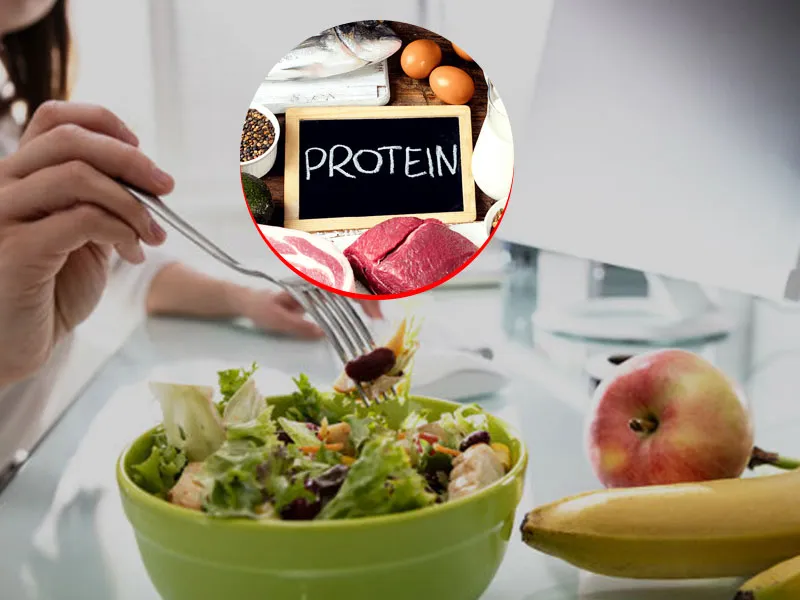
For those who are trying to gain muscle, lose weight, or be healthy, consuming sufficient protein is usually a priority. However, in the process, one might be overeating just to meet their protein needs. The consequence can lead to excess calories, weight gain, digestive upset, and a diet that's more stressful than nourishing. Basically, overeating protein can do more harm than good.
Table of Content:-
So how do you know if you're really eating for protein, or just overeating in the name of nutrition? To have our answers, we reached out to our expert, Dr Pooja Pillai, Consultant – Internal Medicine, Aster CMI Hospital, Bangalore, and here is what she shared with us.
Why Is Protein Important, and How Balance Is More Important
Protein is used to repair muscles, regulate hormones and immune function, and as a source of energy. “Most adults require approximately 0.8 to 1 gram of protein per kilogram of body weight, but those who are physically active, pregnant, or working to gain muscle mass might require more, approximately 1.2 to 1.6 grams per kilogram,” explained Dr Pillai.
“However, things go wrong when individuals up the portion sizes of protein food such as chicken, paneer, lentils, or eggs rather than apportioning intake wisely across meals. This results in consuming more calories than are necessary, even when the motive is health-centred,” she added.
Also Read: Can You Lose Weight Doing Only Burpees? Experts Break Down the Truth

Signs You're Overeating in the Name of Protein
According to Dr Pillai, following are salient signs you're taking in more than required protein:
1. You're Eating Huge Portions to Meet Your Requirement
Rather than distributing 20 to 30 grams of protein over each meal, you pack one or two meals with big portions such as 300g of paneer or four eggs at a time.
2. Your Calorie Intake Has Increased
A calorie excess can creep in even with healthy high-protein foods, particularly if you are depending on protein accompanied by fats (such as nuts, cheese, or peanut butter) or carbs (such as bread, roti, or rice).
3. You're Full But Still Forcing Yourself to Eat
If you're eating beyond the point of satiety simply to meet a protein objective from your tracking software, you're more than likely overeating.
4. You're Gaining Weight Instead of Lean Muscle
Without proper strength training and balanced macros, excess protein calories will translate to fat, causing unwanted weight gain.
5. You Feel Bloated or Experience Digestive Discomfort
Too much protein, particularly from dairy, meat, or supplements, can lead to bloating, gas, constipation, or acidity.
Also Read: Could an Unhealthy Scalp Biome Cause Hair Loss? Find Out Here

How to Know If You Actually Need More Protein
Dr Pillai highlighted that before you boost consumption, keep these in mind:
Are you actually protein-deficient?
If you're consuming balanced meals with dal, dairy, nuts, tofu, eggs, fish, or lean meats, you're probably fine.
Is your objective muscle development or weight loss?
Protein requirements differ. A sedentary adult won't require as much as a weightlifter.
Are you spreading protein throughout the day?
The body digests and uses moderate amounts better than big meals.
Ways to Boost Protein Without Overindulging
“You don't have to double your meals, just maximise your picks,” Dr Pillai suggested. Here are some expert-approved ways to boost your protein intake without overeating:
1. Incorporate Small Protein Sources into Each Meal
- Breakfast: Greek yoghurt, eggs, sprouts
- Lunch/Dinner: Dal, legumes, tofu, chicken, quinoa
- Snacks: Roasted chana, seeds, whey or plant protein shake
2. Replace Instead of Stacking
Substitute protein for carbs or fat instead of adding it as an extra. For instance:
- Paneer instead of additional rice
- Lentil soup instead of fried foods
- Tofu stir-fry instead of creamy curries
3. Monitor Protein, Not Calories
Employ food labels or apps to monitor how much protein you really need and are eating.
4. Utilise Supplements Judiciously
If your meal is inadequate, have a scoop of whey or plant protein instead of overindulging in whole foods.
5. Blend Plant Proteins
Blending lentils, beans, seeds, and grains throughout the day will satisfy needs without consuming too many calories.
Bottomline
Consuming enough protein is essential, but not at the expense of overindulgence or imbalance. Prioritise portion control, well-balanced meals, and intelligent distribution over excessive servings. Experts emphasise that our bodies require just the right amount, and not excessive amounts.
Also watch this video
FAQ
1. How much daily protein do I actually need?
Most adults require 0.8 to 1.2 grams per kg of body weight, depending upon activity and purpose.2. Does additional protein convert to fat?
Yes. Any excess calories, protein as well, can be converted to body fat if unused.3. How can one best consume adequate protein without overeating?
Allocate small portions of protein throughout meals and add supplements or snacks as necessary rather than elevating main meal portions.
How we keep this article up to date:
We work with experts and keep a close eye on the latest in health and wellness. Whenever there is a new research or helpful information, we update our articles with accurate and useful advice.
Current Version
Oct 13, 2025 18:55 IST
Modified By : Tanya SrivastavaOct 13, 2025 18:55 IST
Published By : Vani Malik